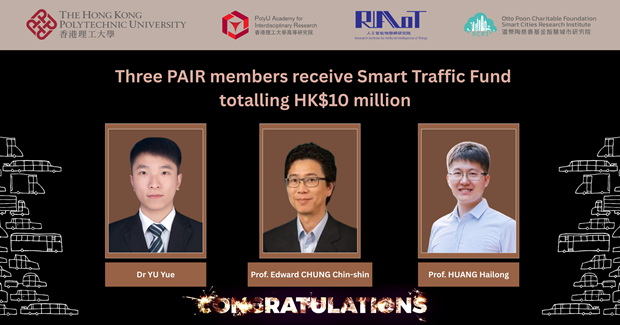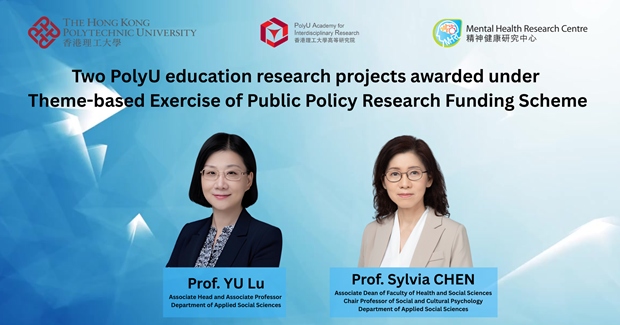The Innovation and Technology Commission of the HKSAR Government has recently announced the second batch of projects selected for funding under the Research, Academic, and Industry Sectors One-plus (RAISe+) Scheme. Among the four successful projects from The Hong Kong Polytechnic University (PolyU), three are led by PAIR members.
Inaugurated in 2023, the RAISe+ Scheme aims to provide funding, on a matching basis, for at least 100 research teams from universities funded by the University Grants Committee which demonstrate strong potential to evolve into successful startups. Each approved project will receive funding support ranging from HK$10 million to HK$100 million.
|
Project Title |
Project Leader |
Project Description |
|
High-Speed 3D Stacked AI Vision Sensors |
Prof. CHAI Yang |
This project focuses on the development and commercialisation of an advanced AI vision sensor with high-speed operation, high dynamic range, and ultra-low power consumption. The sensor overcomes key limitations of conventional image sensors, particularly motion blur in high-speed scenarios. Key applications of the AI vision sensor include security surveillance systems, autonomous navigation, and motion analysis in extended reality devices and smartphones.
The sensor achieves high-speed, high-dynamic-range, and low-power imaging through the integration of conventional image sensors with dedicated visual information processing chips. |
|
Novel Nutraceuticals for Neurodegenerative Diseases |
Prof. Simon LEE Ming-yuen |
This project develops novel nutraceuticals and drugs derived from natural resources for treating neurodegenerative diseases. It establishes the LifeChip technology platform, combining next-generation DNA sequencing, AI-driven discovery, advanced chemical separation, high-throughput in vivo screening, and synthetic biology. Focusing on neurodegenerative diseases like Alzheimer’s and Parkinson’s, as well as neurological disorders including insomnia, depression, and anxiety, this integrated approach delivers a comprehensive solution for both prevention and treatment using innovative nutraceuticals with unique mechanisms of action. For instance, the development candidate Oxyphylla® is a first-in-class drug targeting α-synuclein, an emerging therapeutic target for Parkinson’s disease. Oxyphylla® is anticipated to become a disease-modifying therapy, offering a breakthrough in neurological health. |
|
Tunable Laser Chip Based on Metasurface Structure and its Application |
Prof. YU Changyuan
|
This project pioneers a novel broadband tunable laser chip that, for the first time, integrates both a metasurface reflector and phase-change materials within a vertical-cavity surface-emitting laser. This enables an ultra-high quality factor resonant cavity and dynamic continuous tuning of the output wavelength over an exceptionally wide bandwidth (40nm).
Compared to traditional laser structures, the chip not only features a more compact design but also achieves the same kHz-level tuning speed as leading international competitors. With the cost just one-twentieth that of existing market solutions, the chip is expected to achieve widespread adoption in battery monitoring systems, industrial production processes, autonomous driving technologies and high-speed optical communication modules. |
Press release: https://www.polyu.edu.hk/en/media/media-releases/2025/0620_polyu-research-projects-win-funding-support-from-raise-scheme/
Online coverage:
Oriental Daily News - https://polyu.me/3FZoEPp
Ta Kung Pao - https://polyu.me/45va2Sk
Wen Wei Po - https://polyu.me/44jUdfY
Line Today - https://polyu.me/43OTu6y
CCTV - https://polyu.me/4ehx1T9
Wuxi Daily - https://polyu.me/3Gat71H
Science Net - https://polyu.me/43ULCjN
The Paper - https://polyu.me/4klyyJr
CHNM - https://polyu.me/3ZGc6D8
Sina - https://polyu.me/4ecyiL4
Guangzhou Daily - https://polyu.me/43Xn35V
CMG The Greater Bay Area - https://polyu.me/3TQ4muV
| Research Units | PolyU Academy for Interdisciplinary Research |
|---|
You may also like







